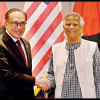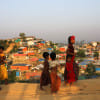ADB okays $100m for Rohingyas
The Asian Development Bank has approved a grant assistance of $100 million -- the first of an envisaged package totaling $ 200m to help Bangladesh develop basic infrastructure and services for Rohingyas.
Since late August last year, over 700,000 Rohingyas have crossed the border from Myanmar's Rakhine State into Cox's Bazar of Bangladesh. The displaced people are living in 32 camps in the district.
Providing food, shelter, health, sanitation, water, and other essential services at the camps and fending off diseases is a daily challenge. If unaddressed, conditions are feared to worsen dramatically.
“Given the scale of the humanitarian needs, we are coordinating closely and promptly with World Bank and other development partners to support the government in addressing the crisis in Cox's Bazar,” ADB President Takehiko Nakao said yesterday.
After Nakao received the request from Bangladesh Finance Minister AMA Muhith for grant assistance in early May, ADB developed and processed the project at an extraordinary speed under its emergency procedure, according to an ADB statement issued in Manila.
The $ 100m grant project will support the displaced people sheltered in camps in Ukhia and Teknaf upazilas of Cox's Bazar focusing on water supply and sanitation, disaster risk management, energy, and roads.
The project will rehabilitate roads within the camps to connect essential food distribution and storage centers, hospitals, education facilities, and provide emergency access.
It will also resurface the road from Cox's Bazar to Teknaf and other critical sections.
To address water needs, the project will provide mobile water carriers, community bathing facilities, and build a piped water supply system and waste management facilities, together with small water treatment plants.
Under the project, solar powered and mini grid-connected street lighting will be provided. It will enable access to electricity augmented by substations, distribution lines, and transformers.
The southeastern part of Bangladesh is highly susceptible to various types of natural hazards, including flooding, landslides, lightning, and heat waves.
Given these potential challenges, the project will strengthen disaster risk management by constructing cyclone shelters with emergency access roads, as well as food distribution centres, walls to protect against landslides, and a storm water drainage network.
The ADB support will be within the framework of multi-sector Joint Response Plan prepared by the UN-led Inter Sector Coordination Group.
The project will be implemented in coordination with UN agencies, the World Bank, and other donors who are providing humanitarian relief such as food, water, medical aid, and temporary shelter.
The first phase is costing $ 120m over about two and a half years. The first ADB $ 100m grant will come from the Asian Development Fund (ADF), while the government will provide $ 20m.
Nakao appreciated the ADF donors' prompt endorsement of grant financing for Bangladesh.
The scope and timing of a second phase of ADB grant support of another $ 100m will be determined based on the progress of the first phase.

 For all latest news, follow The Daily Star's Google News channel.
For all latest news, follow The Daily Star's Google News channel. 







Comments